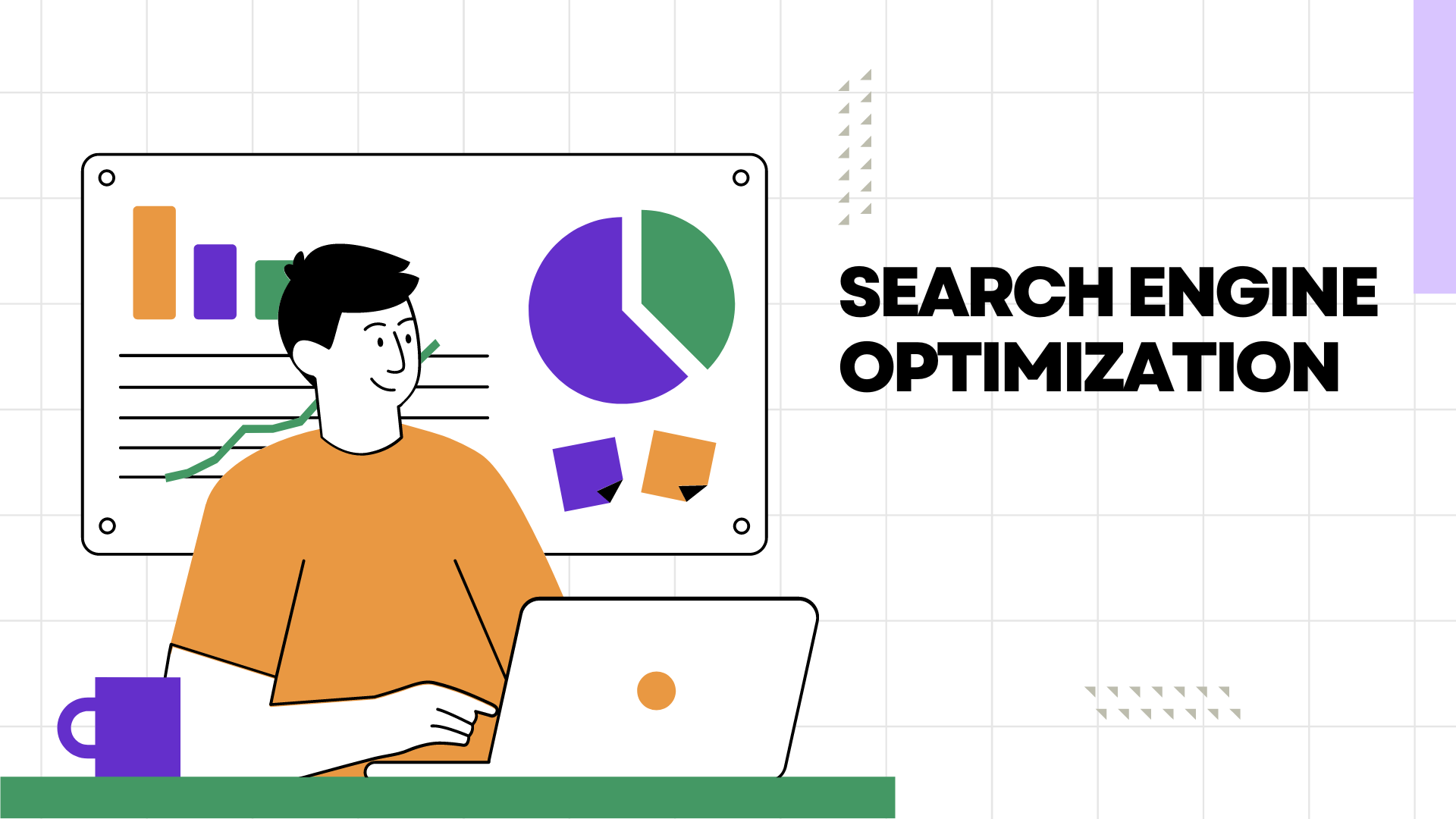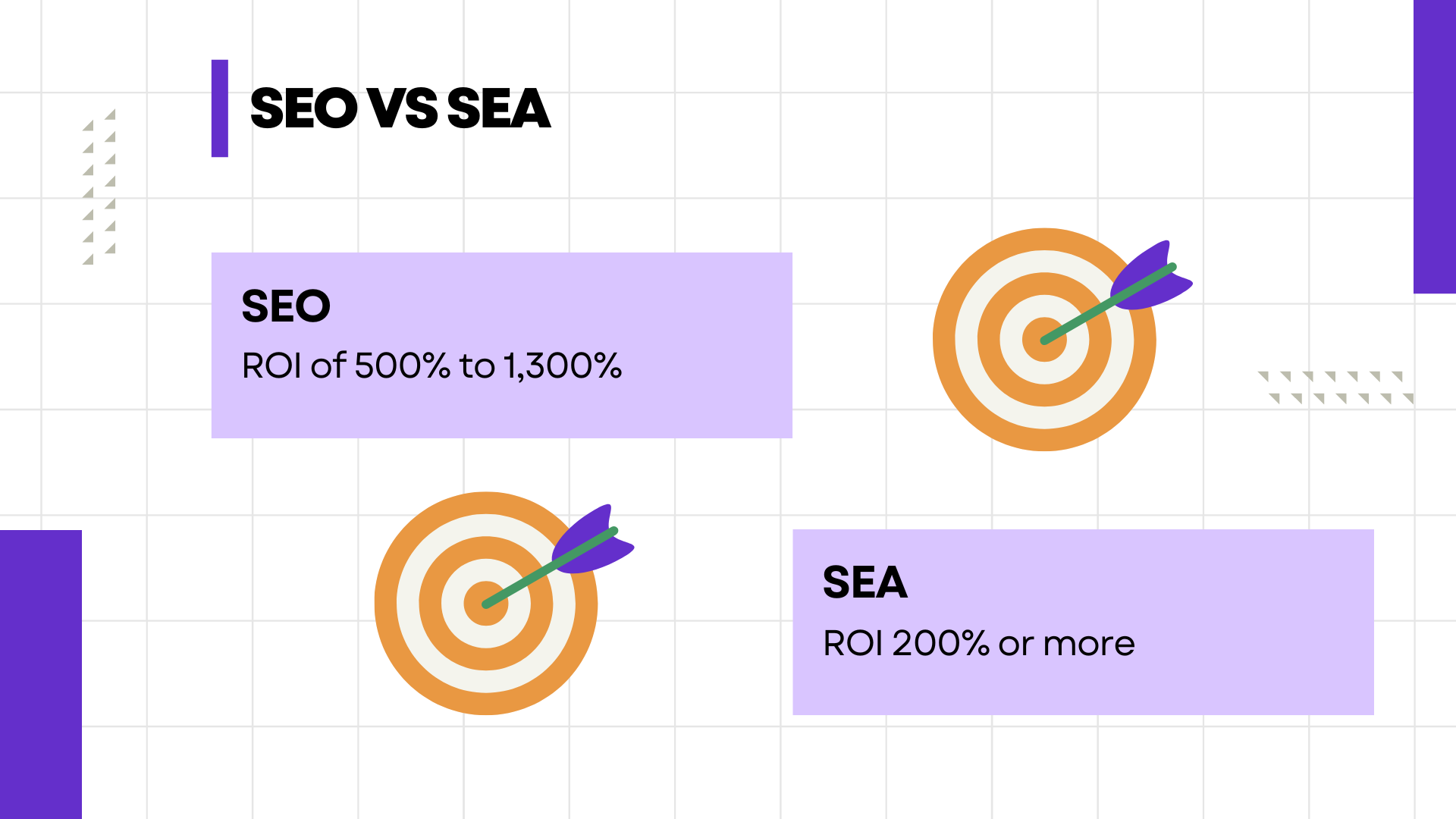SEO and SEA Marketing: Difference and What are the Advantages of the Two?
Two key digital marketing tactics are SEO vs SEA. This article explains the main distinctions between these two approaches and highlights their benefits. Marketers, small business owners, and anybody looking to improve their digital presence must know when and why to use SEO or SEA.
What is SEO?
SEO optimizes a website for organic search results. On-page improves content, meta elements, and images, while off-page optimization builds links and domain authority. SEO involves keyword analysis and content generation.
The Backbone of Organic Search Success
SEO has many benefits, like:
- The cost of promoting a website in organic search can be less than the cost of ad spending, which means that SEO can be more profitable.
- Users trust native offerings more.
- SEO benefits for long-term website growth: a well-thought-out promotion strategy can generate online traffic without investments.
- Search optimization builds user trust and loyalty.

To achieve a similar result, it is worth improving the metrics that Google search engine uses to rank websites.
- Browse for comprehensive keywords
Rigorous analysis is needed to uncover relevant keywords. With keyword optimization, brands can make their content more relevant to users and understandable to search engines. Prioritize long-tail keywords because of lower competition.
- Make high-quality, useful blog posts
For organic traffic, it is important to create original materials that will interest your visitors.
- On-page optimization
Pay attention to the header, meta tags and images. Optimizing website speed for fast loading times and mobile speed also can improve Google rankings.
- Strong link building
Work with credible websites, guest post, and do outreach to gain strong backlinks. Partnerships with trustworthy sites can boost domain authority.
- Engage with Social Media
Use relevant social media sites to promote content and drive traffic to the site.
- Monitor and evaluate results
Track the website’s activity with Google Analytics and Search Console. Use organic traffic, bounce rates, and CTR to evaluate your SEO tactics.

What is SEA?
Search engine advertising uses targeted ads in search results. Campaigns, usually Pay-per-click (PPC), let companies compete for ad positions using keywords relevant to their items. This method boosts website traffic and brand exposure faster than SEO.
The Art of Paid Search Dominance
It is hard to disagree that SEA has many benefits:
- Advanced segmentation lets reach certain types of people and interests.
- Performance metrics enable campaign evaluation and change.
- Budgets, ad placements, and bidding tactics are flexible and controlled by marketers.
Companies can improve online sales by following these SEA tips for increasing conversion rates:
- To reach the right audience, optimize segmentation with demographic and interest-based targeting. Orienting ads to specific segments enhances conversions by matching audience needs.
- Make use of action-oriented ad language that precisely expresses value propositions. Whether users are joining up, making a purchase, or learning more, a powerful call to action (CTA) motivates them to complete the intended activity.
- Ad extensions let you add extra information as site links, call buttons, or geographical details. These components provide consumers more reasons to interact with the ads, hence improving ad reach and motivating clicks.
- Align landing page with ad content and enhance user experience. Landing pages with fast load times, straightforward navigation, and clear messaging can boost conversions.
- Test and Improve Campaigns: A/B test headlines, graphics, and CTAs regularly. Owners of commercial campaigns may determine what works best for their target audience by analyzing variation performance. One of the most convenient tools for this -Google Analytics.
-
Retarget non-converting brand interactions. This strategy is designed to keep the brand in mind and attract passion from users.
Comparing SEO and SEA
Companies must grasp SEA vs SEO marketing to create effective strategies. Both strive to build online popularity and traffic but on different principles and schedules.
- Cost: SEA uses a paid approach; SEO mostly worries about natural searches.
- While SEA can produce rapid traffic, SEO is a long-term investment that might take weeks or months to show benefits.
- However, SEA offers temporary awareness, while SEO provides a steady flow of users over a long time.
- Organic results from SEO seem naturally based on relevancy; paid search results are clearly shown as sponsored adverts.
-
While SEA calls for continuous payments to keep exposure, SEO offers long-term rewards.

Organic vs. Paid: The True Cost of Search Visibility
To determine the best SEO and PPC strategy for a firm, ROI must be analyzed. Long-term investments are needed for SEO, which can take months to show returns.
Measuring ROI in SEO vs. SEA campaigns shows that with an ROI of 500% to 1,300%, SEO usually proves more cost-effective over time.
In the case of Google Ads, and in particular PPC, usually returns 200% or more. Although instant visibility is provided, each click on an advertisement results in a cost and calls for ongoing financial commitment.
Timing is Everything: Long-Term Gains vs. Instant Gratification
Sometimes it takes a long time to implement the SEO strategy for the site. Google algorithm also takes time to index pages and arrange them in the Google. This may take one week, occasionally a month, or even more.
Meanwhile, search engine advertising is soon established. To maximize its effectiveness, the marketer must choose the correct features. Since the firm pays per user, the ad cost rises considerably.
Trust and Perception: User Behavior Towards Organic and Paid Results
Analysis shows that 70–80% of people disregard paid adverts and look for more natural results, demonstrating their trustworthiness. Studies demonstrate that organic results get around 10 times more clicks than paid ads, which generally come at the top of search engine results pages (SERPs). Data shows that 45% of people click on a paid ad when they want to buy, therefore PPC ads can generate quick interaction.

SEO and SEA: Better Together
Although search provides continuous traffic over time, paid adverts are a must-have instrument for reaching clients at the moment of intent, so it is advisable to take both techniques into account in a whole commercial strategy.
So, it makes sense for businesses to use SEA and SEO together.
This is called Search engine marketing (SEM):
promotes brands through search advertising. It uses SEO and SEA to boost site rankings.
Best practices for integrating SEO and SEA:
-
Sharing keyword insights from SEA can inform SEO campaigns. Choose the most profitable tags.
- Align material Strategy: Create SEO- and SEA-friendly material. A consistent message across channels requires relevant and valuable content for search engines and paid ads.
- Measure campaign performance combined. Understanding which key phrases convert better purchased versus organically might improve channel strategy.
- Retargeting Opportunities: Retarget organic site visits using SEA campaigns. This boosts brand familiarity and conversions.
-
Coordination of seasonal campaigns. An integrated approach using Google and paid channels can boost exposure and engagement during important periods.
The Perfect Partnership: How SEO and SEA Can Amplify Your Strategy
Combining search engine advertising with SEO raises brand visibility and profit margins. Businesses can attract more traffic by using the strengths of both tactics. Long-term strategy is built on SEO, which keeps a company’s name visible to users seeking relevant content and solutions. SEA can quickly adapt to market changes and target specific audiences.

SEO techniques to complement SEA efforts:
- To attract local customers, optimize Google My Business listings and use regional keywords. Local search SEA campaigns can leverage this.
- Check your website’s load times, mobile friendliness, and HTTPS security.
- Create intriguing meta descriptions and title tags to get users to click on your advertising or website links.
- Optimize your website in response to all the suggestions of search engines.
For a continuous gain, businesses should use SEO. For urgent traffic or time-sensitive offers, SEA may be better. Digital marketing outcomes are best when both tactics are used strategically.
Choosing the Right Strategy: Balancing Between SEO and SEA
Overall, SEO vs SEA are complementary online selling tactics. Both attempt to improve website traffic, but their cost, time to results, and brand recognition differ. Companies and marketers must understand these differences to maximize each approach’s benefits. A complete selling strategy should combine SEO and SEA for continuous growth and rapid success. Thus, before choosing between SEO and SEA for business goals, a firm must thoroughly evaluate its aims and conditions.
Contact Webugol today for expert advice about your marketing strategy. Start optimizing your internet presence now!


